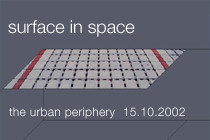Lecture
Surface in Space
The Urban Periphery

Surface in Space
With: Anna Detzlhofer, Klaus Overmeyer, Günther Vogt
Moderation: Jens Dangschat
Surface In Space
A series of lectures in collaboration with Ebenseer Betonwerke and Zement + Beton
.
“Surface In Space” is presenting realised or planned projects for the design of contemporary public space by architects around the world on four different evenings. The focus of the series of lectures is on planning strategies and designs relating to urban space, landscaping and gardens, for village space and small towns as well as on the periphery of urban zones.
The Urban Periphery
Tuesday, 15th October 2002, 6:00 P.M. – 9:00 P.M.
Architekturzentrum Wien, Podium
The peripheries of cities are transitional areas or spaces in between. The qualities ascribed to such areas include banality, vagueness, and radical change. They belong more to supra-regional systems of reference between cities than to the cities themselves. Severed from the images of the inner city they develop far removed from the mentality of the latter as something multivalent and distinctly different. At the same time, when seen from the centre, the urban periphery represents the reverse side of traditional culture, characterised by scenarios of trash, mass consumerism, mainstream leisure activities, industrial production premises, storage areas, a landscape of recycling, a place where goods are taken out for storage or where they are finally dumped.
In the projects presented here architects adopt a stance on the images, impressions and possibilities for development of peripheral urban areas and reflect current trends in urbanisation and regional planning.
Greeting:
Dietmar M. Steiner, Architekturzentrum Wien
Karl Gril, Ebenseer
Felix Friembichler, Vereinigung der Österreichischen Zementindustrie
Hadersdorf model housing development, Vienna
Anna Detzlhofer, landscape architect, Vienna
The Mauerbach model estate lies open to the south on the Westbahn railway tracks in the 14th District of Vienna.
The aim is to develop new types of apartments in a concentrated form. The collection of completed solitaires means that a concept for the open-air spaces independent of the buildings is necessary. The planting must create both spatial distance as well as establishing a cohesive texture.
In order to be a part of the natural surroundings, or to appear to be so, country-specific camouflages were developed – different ones for desert regions than for green-dominated or heavily forested countries. The image of the camouflage (in this case it is the Austrian version) serves as a pattern to be realised using planting. The position on the slope will mean that it is not only possible to perceive this image from the sky. The fleeting glimpse from the Westbahn, from the train, will reveal a changing image of camouflaged countryside.
Revaler Viereck, Berlin, Urban Catalysts
Klaus Overmeyer, Cet-0, Berlin
Let’s Make Things Better. Temporary Motors For Urban Development
Cycles of urban development repeatedly produce new stretches of urban wasteland and empty spaces. While traditional mechanisms for development often fail to take a hold over a period of years under weak economic conditions, unstable political circumstances or unclear ownership status, residual spaces in many major European cities are revitalised by temporary interim usage. Usually spontaneous, such spaces are occupied with a minimum of investment and soon develop into a hotbed for a broad spectrum of different usage. The potential for interim use has previously neither been recognised by classical urban planning authorities nor taken into consideration in the planning procedure itself.
Taking five European zones analysed in the Urban Catalyst EU research project as examples, Klaus Overmeyer is presenting the motivation for and tactics behind temporary usage, and explaining how specific strategies and instruments for temporary use can be integrated as motors for the processes of urban development.
Projects
Günther Vogt, landscape architect, Vogt Landschaftsarchitekten AG, Zurich
Moderator: Jens Dangschat, Vienna, University Professor for Settlement Sociology and Demography at the Vienna University of Technology
